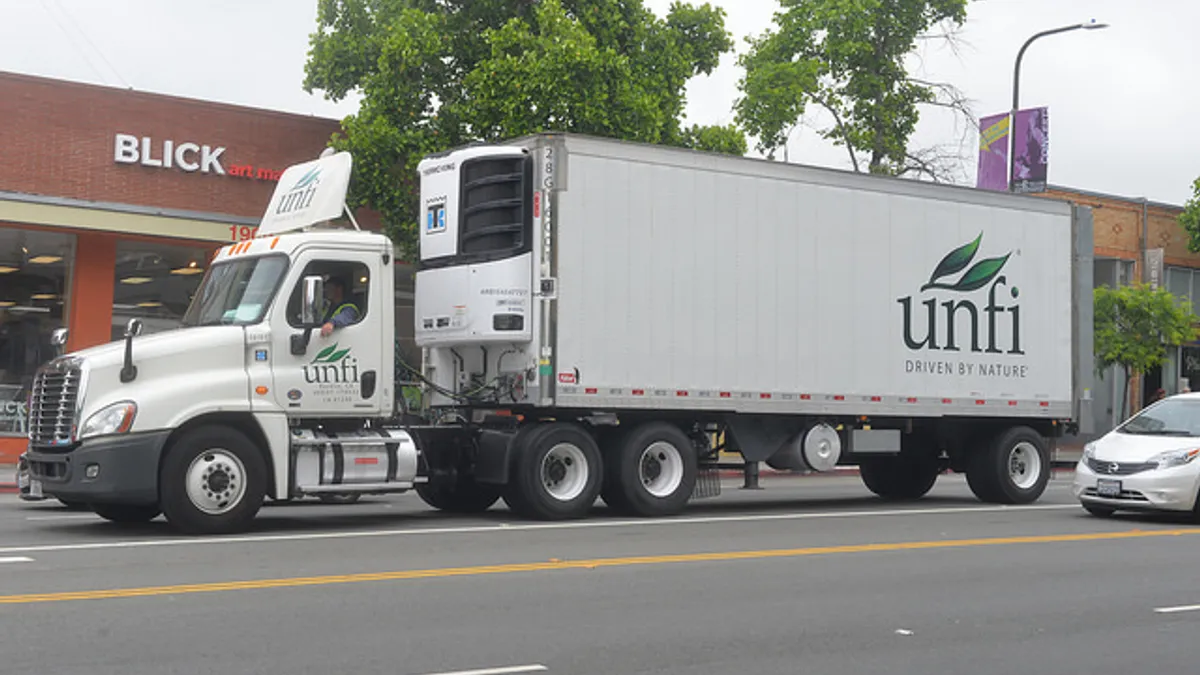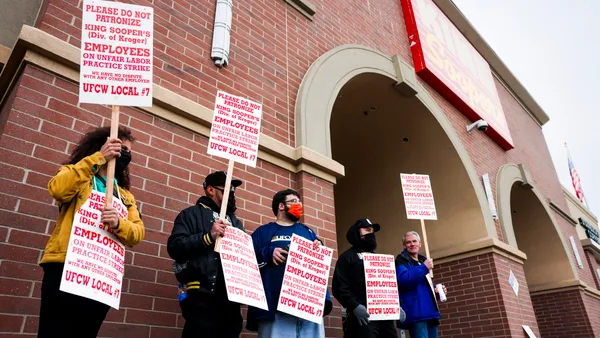Dive Brief:
- United Natural Foods Inc. reported revenue of $2.59 billion for the fiscal fourth quarter, up 10.7% from the same period last year. These results were in line with expectations, but the company’s adjusted earnings per share of 76 cents fell below the estimated 86 cents projected by Wall Street.
- In a statement, UNFI’s chairman and chief executive officer Steve Spinner attributed the profit dip to higher-than-anticipated freight costs and a customer mix that saw less growth coming from its high-margin retail customers. UNFI’s gross margin was 14.5%, down 125 basis points from the year-ago period.
- "We are on track to close the Supervalu transaction in the fourth quarter of calendar 2018, and our teams are hard at work planning for the integration to capture the significant synergies and strategic benefits of this transformative combination, positioning our company for growth and value creation," Spinner said in a statement.
Dive Insight:
UNFI continues to grow along with Whole Foods, its largest customer, with sales to the retailer up 21.4% over the past year. As the specialty retailer brings in more customers with its Amazon Prime discounts and other moves, UNFI will see its revenue rise, as well. Reports note that UNFI is tied to Whole Foods for the next several years, serving as its main supplier partner.
But while Whole Foods is UNFI’s fastest growing customer, it is not its most profitable. The wholesaler noted that the higher-margin conventional and independent channels saw much slower growth during the quarter. Indeed, while UNFI saw sales jump 27.5% in the “supernatural” channel — of which Whole Foods is its sole customer — independent customer sales grew 5.7% while supermarket sales increased just 1.1%
Freight costs, which have weighed on companies across the food industry, continue to take a toll on UNFI’s results, too. This was the case during the wholesaler’s previous quarter, and the company projects the problem will persist in the near-term.
UNFI hopes its Supervalu acquisition will help alleviate some of these headaches. The Minneapolis-based wholesaler diversifies its customer mix and adds important capabilities in specialty and fresh foods. Sixty-one percent of Supervalu’s business is with independent regional supermarkets compared to 25% for UNFI.
“One of the things the independent supermarkets need the most are the products that we have,” UNFI chairman and CEO Steve Spinner said during yesterday’s earnings call. “So, one of the greatest growth opportunities outside of cost synergies are associated with us selling our existing better-for-you products into Supervalu’s existing independent supermarket customer base.”
UNFI estimates that acquiring Supervalu will deliver $175 million in cost synergies over three years. The wholesaler also cites expansion to new markets and upgraded technology and systems as further benefits of the deal.
But the tie-up puts significant strain on UNFI, as well. For one, the company will take on significant debt to fund the deal. It also has a lot of integration work ahead of it, with Supervalu still processing recent acquisitions of Unified Grocers and Associated Grocers of Florida.
“This is really an atypical kind of acquisition in terms of scale,” Ajay Jain, a senior research analyst with Pivotal Research Group, recently told Food Dive. “It’s going to result in a lot of leverage. The sheer scale of integration work is going to be massive.”
UNFI plans to use sales of Supervalu’s retail stores to help fund the acquisition. The sale of 19 St. Louis area Shop ‘n Save stores to Schnucks were the latest chips to fall, leaving Supervalu with its Cub Foods, Hornbacher's and Shoppers Food & Pharmacy stores still remaining.
UNFI faces a difficult road ahead, but it’s focused on the long-term goal of becoming a dominant player in the U.S. wholesaling industry.













